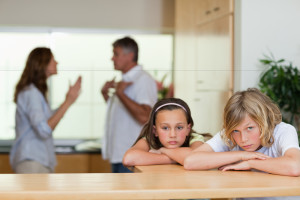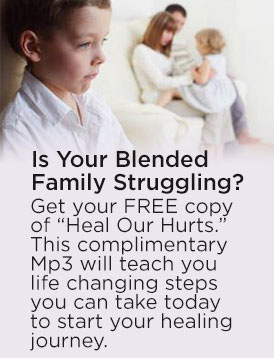Fill in the blank: Kids who experience conflict in the home are more likely to…
In today’s world, parents struggle to keep their children safe from psychological harm. We often wish that we could control the books they read, the music they listen to, and the TV shows they watch, solely because we fear the negative influence that media can have on their development. But surprisingly, many parents overlook one of the most important factors in their child’s psychological well-being. They don’t see themselves and their relationships as external influences on children. In truth, children who experience parental conflict are often at a higher risk for a number of psychological and behavioral problems.
This is especially the case when it comes to couples who clash in parenting style. Research from Baylor College of Medicine in Houston, by Dr. James H. Bray, shows that behavioral problems are more likely to occur in children whose parents have differing opinions on parenting style. For example, if one parent is very strict and the other lets the kids do anything they want, it can lead to disagreements as well as confusion on the part of the children. But even when disagreements aren’t over parenting issues, excessive parental conflict still hurts children.
According to Rabbi Yisroel Roll, a licensed child psychotherapist, there are three main negative responses that children have towards parental conflict: First, the child’s emotional security may plummet. “A child needs emotional safety and security in order to thrive academically and socially,” he says. “The environment in the home between the parents creates that sense of security. That’s the child’s world. When there is conflict, argument, [and] tension between the parents, that basically shatters the secure safety net of the children.”
Secondly, children may blame themselves for the conflict. In a child’s mind, the world revolves around their actions. When they hear their parents arguing, they may be convinced that it is their fault even if it has nothing at all to do with them. When the conflict does revolve around discipline issues, the child can feel even guiltier.
The third possible response that children might have to parental conflict is to act out.
Rabbi Roll maintains that if a parent wants a misbehaving or unmotivated child to come to a therapy session, he must see the child and parents together for a family session first. “The child is often reacting to what’s going on between the parents,” says Rabbi Roll. “And sometimes, this may sound shocking, but children act up on purpose in order to get their parents to get their act together. They know psychologically that the parents are not on the same page, and they want to force their parents to try to deal with them. Once you see better parental communication, more observable warmth, respect and love between the parents, the children simply calm down.”
Surprisingly, there’s actually an advantage to all this. Rabbi Roll explains that unless people are extremely motivated towards self-growth, the only real way to strengthen a marriage is through conflict resolution. “Conflict is an opportunity for a couple to work on themselves, as a couple and as individuals…Too much conflict incapacitates the marriage, but a little bit of conflict is a good thing. A little bit of anxiety is a good thing; a little bit of guilt is a good thing too. Conflict is a message from within the marriage to improve communication and to get their act together.”
In addition, it’s healthy for children to watch parents communicate with each other to settle an argument, assuming that it’s done in a caring and effective way.
Any of these behaviors sound familiar?
Here are some steps you can take to reduce disagreements with your partner:
- Compromise whenever the issue does not revolve around an issue that you feel is absolutely nonnegotiable, like safety. This doesn’t make you a pushover; it just means that you’re willing to pick your battles and avoid a constant war zone. Visit a marital counselor to try to work things out.
- Attend a parenting class together with your spouse, especially if the conflict is related to differing parenting styles.
- Communicate using “I” messages. Instead of using the word “you,” such as “You messed up,” or “You make me feel so upset,” begin with “I”: “I am feeling frustrated. I don’t like it when you…”
- Keep your disagreements away from the kids. If you must disagree, realize that doing so in front of the children almost guarantees that the situation will generate some of the negative repercussions discussed in this article.
If you need help and support with high conflict parenting or parent/child reconciliation, please DON’T WAIT, call today to The Center for Family Unity 619-884-0601









